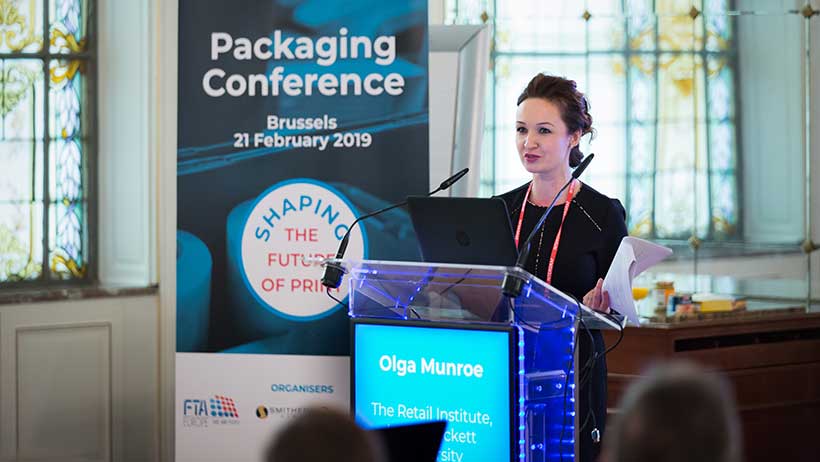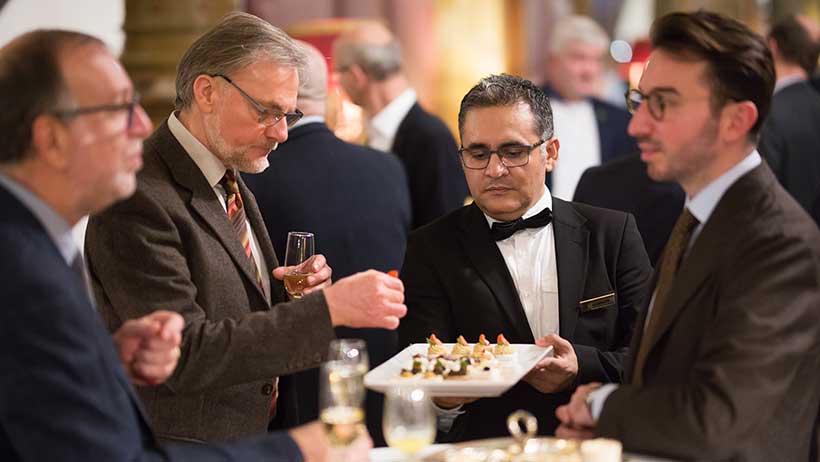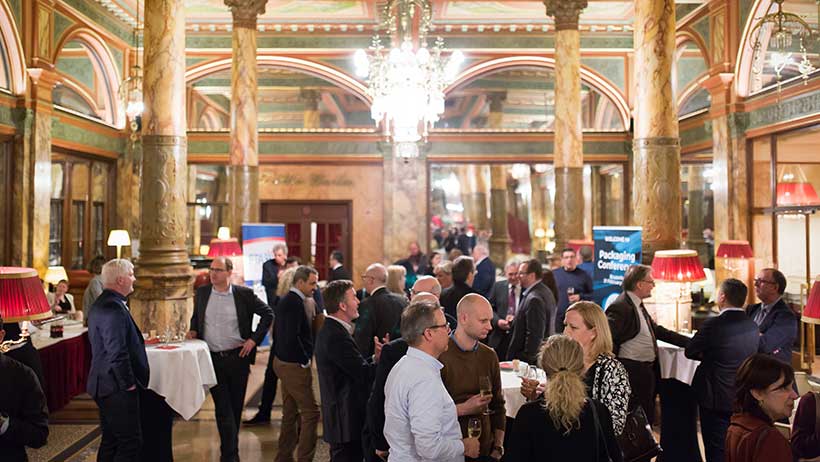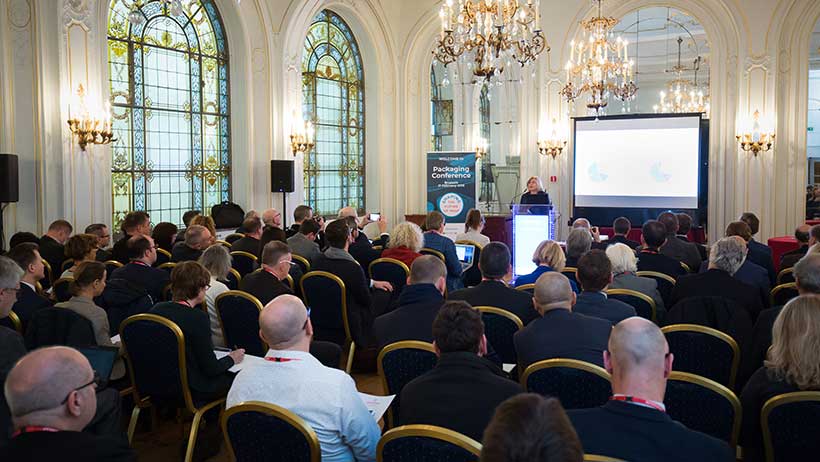Over 100 leading packaging industry professionals met last week in Brussels for the fourth annual ‘Shaping the Future of Print’ conference: Packaging Conference 2019 on 21 February. This event was organised by Intergraf, in partnership with FTA Europe and Smithers Pira. It was sponsored by GAMA International, TRESU Group and Kodak.

Speakers:
- Ania Krolak, Managing Consultant at Smithers Pira, ‘European Printed Packaging Trends’
- Kęstutis Sadauskas, Director for the Green Economy at DG Environment, European Commission, ‘Packaging Design and Systems for a Circular World’
- Olga Munroe, Head of The Retail Institute at Leeds Beckett University, ‘Increasing Consumer Satisfaction through Sensory Packaging’
- Guy Douglass, Creative Strategy Director at Parker Williams Ltd. / Sun Branding Solutions, ‘Inclusive Design Inspired by an Aging Population’
- Mark Shaw, Innovations Manager at Parkside Flex, ‘Compostable Packaging: A Viable Alternative’
- FTA Europe Diamond Award 2018 winner Pierluigi Gava, ‘Company Case Study’
- Peter Ragaert, Professor at Ghent University and Project Manager at Pack4Food, ‘Functionality, Convenience, and Sustainability of Packaging’
- Joanna Stephenson, Marketing Director of EFIA and Managing Director of PHD Packaging, ‘Packaging Trends’
- Bernd Brandt, Senior Consultant at
denkstatt GmbH, ‘Food Waste or Packaging Waste? Carbon Footprint of Plastic Food Packaging’
The tone of the Packaging Conference was set by the first speaker Ania Krolak, Managing Consultant at Smithers Pira, who pronounced that packaging is currently the “most dynamic sector of print”. Speakers throughout the day reinforced this view with engaging presentations on packaging trends, design, sustainability, and company perspectives.
At the end of the event, delegates took home an exclusive copy of Smithers Pira’s European Printed Packaging Trends: Market Report, which was presented to the audience by Ania Krolak. The report forecasts the market share of flexographic printing will be eroded by 2022 because of the increase of digital printing market in packaging. Nevertheless, printed flexographic packaging domination of the market, in particular in corrugated and flexible packaging, is expected to remain. It is expected to reach €32 billion in 2022, corresponding to an increase of 1% compared to 2017. In her presentation, Ania Krolak stated that there is an essential need to communicate to consumers that “packaging is not the evil of this world”.

Continuing the theme of sustainability, Kęstutis Sadauskas, Director for the Green Economy at DG Environment, European Commission, focused on “living well within planetary boundaries”. Importantly, he highlighted that “we [the European Commission] don’t demonise plastic, we don’t want to get rid of it […], but the trouble with it is the misconduct of its use”. Rather, the Commission’s main focus is the “prevention of waste” and the eco-design of products. To promote the latter, Kęstutis Sadauskas announced the development of guidance on eco-modulation for Extended Producer Responsibility (EPR) schemes that will be mandatory for all packaging by 2024 and a legislative proposal to review design requirements in the packaging waste Directive, i.e. Essential Requirements. Both initiatives are expected by the end of 2019.
Peter Ragaert, Professor at Ghent University and Project Manager at Pack4Food, explained, “we need education to explain to people that packaging does not belong in the environment”. Various other speakers also dealt with issues of sustainability. Mark Shaw, Innovations Manager at Parkside Flex, focused on the development of compostable packaging, which could offer a potential solution to issues of recycling. Improving the functionality of packaging to prevent waste was identified as one of the most important changes packaging producers can focus on. Bernd Brandt, Senior Consultant at denkstatt GmbH, clarified that “the optimised function of packaging is the most important environmental benefit” because “the benefits of prevented food waste are usually much higher than the environmental impacts of production or optimisation of the packaging involved”. Peter Ragaert also dealt with functionality, stating that it is “still the most important quality of packaging”. He went on to clarify that “improved packaging doesn’t mean less or more packaging, it means customised packaging”.
Joanna Stephenson, Marketing Director of EFIA and Managing Director of PHD Packaging, addressed wider packaging trends, focusing on six key areas: consumerism, technology, economics, sustainability, fashion & design and retail revolution. Consumers today are more conscientious and self-sufficient, she explained, plus they desire authenticity and immediacy. According to Jo Stephenson, “long-term consumer engagement through the packaging” is an effective way of reaching these changing consumers. Olga Munroe, Head of The Retail Institute at Leeds Beckett University, added to this in her presentation about increasing consumer satisfaction through sensory marketing. She explored the internal and external triggers which drive purchases – explaining that retailers need to “consider the entire sensory suite [vision, smell, sound, touch and taste] to create truly memorable products”.

Packaging design was further elaborated on by Guy Douglass, Creative Strategy Director at Parker Williams Ltd. / Sun Branding Solutions, who stated that the future is “all about inclusive design”. Guy Douglass explained that “you don’t have to design for the old – you just need to bear the needs of the old in mind”. Jo Stephenson also emphasised the importance of designing packaging for Europe’s ageing population by favouring segmentation based on needs, interests and values, rather than a limiting – and potentially offensive – focus solely on someone’s more advanced age.
Finally, FTA Europe Diamond Award 2018 winner Pierluigi Gava showcased the success of his company, Cartotecnica Postumia, a European flexo printer who engaged in “lean thinking”. He claimed that “changing culture is the most important factor to transform [a business]”.

